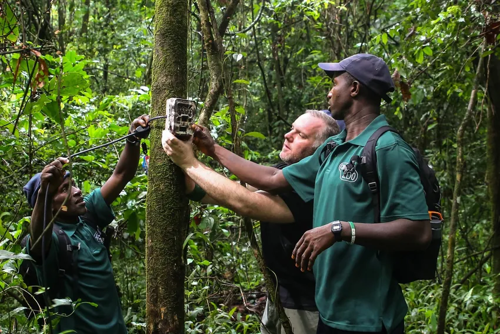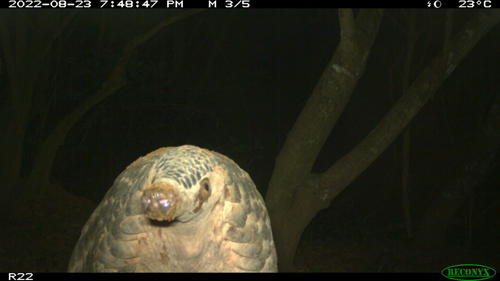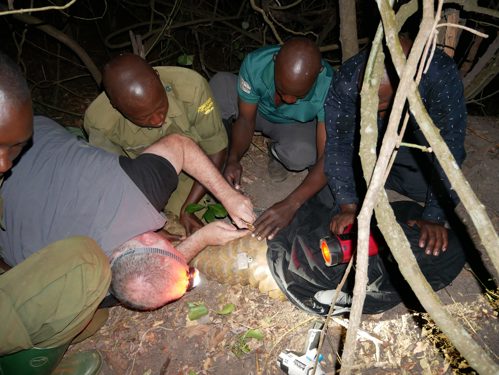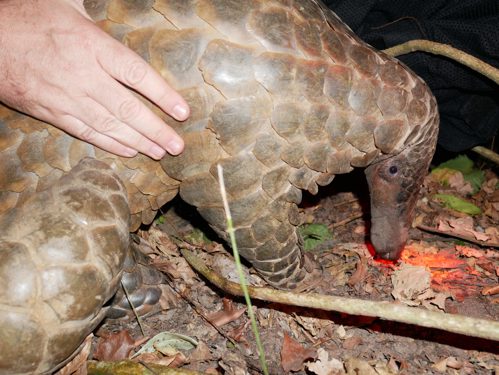
Double your impact for giant pangolins this week
We're raising money to protect one of the world's most trafficked mammals.
We’ve launched an urgent appeal to help save the giant pangolin—a remarkable species and one of the world’s most trafficked and threatened mammals.
As part of the Big Green Give, a national campaign supporting environmental charities, we’re calling on your support to raise vital funds. From 22–29 April, every donation made to our pangolin conservation work will be doubled, meaning your support can go twice as far in protecting this extraordinary animal.
Pangolins are the world’s only scaled mammals, feeding solely on ants and termites. Despite being relatively unknown, all eight species are under extreme threat, and the giant pangolin, the largest of them all, is one of the least understood.

We’ve spent years working in some of the most remote parts of Africa to better understand and protect this elusive species, building knowledge that simply didn’t exist before. It all started with a few strange burrows, rare camera trap sightings, and a lot of determination from our passionate field teams.
When Stuart joined us in 2015, one of the very first questions asked by Naomi Matthews—then a junior field team member—was, “Are we going to have an African pangolin project?”
We were just starting to realise the enormous threats facing African pangolins. The illegal trade in scales for traditional Asian medicine had overtaken that of ivory and rhino horn – yet very few people were looking at them, especially the giant pangolin, the largest of all pangolin species.
It is difficult to protect a species when you don’t know where they live, how many there are, how they reproduce, or how they behave. We felt they urgently needed attention.
Stuart Nixon, Regional Field Programme Manager for Africa
In Gashaka Gumti National Park in Nigeria, where we were surveying chimpanzees, we captured one of the first images of a giant pangolin in the country on camera trap footage. It was a discovery that sparked a dedicated conservation journey.
In 2017, we were invited by the Uganda Wildlife Authority to begin a pangolin census. Our early surveys were difficult. Long days in the forest produced very little—just one pangolin recorded on camera after six gruelling months in the field.

Conservation is a science, and negative results are part of the process. It was a real wake-up call about the urgency of the situation and how pangolin poaching had slipped through the net.
Stuart Nixon, Regional Field Programme Manager for Africa
We then shifted our focus to Ziwa Rhino Sanctuary, where rangers had recently reported a pangolin sighting. With better conditions and a refined survey approach, we documented a small population of fewer than 20 individuals.
It was here that we achieved a global conservation first: the successful tagging of a Giant Pangolin to track her movements.

It was midnight when we got a sudden call. The rangers, who patrol Ziwa 24/7, had found a giant pangolin in a thicket – only the second time they’d ever seen one.
She was safely held by the rangers so we could attach the GPS and radio tags securely to her huge scales. She was calm, but we could feel just how immensely strong she was – a huge ball of hard scales and coiled muscle. We named her Sungura-Mwezi, which means ‘rabbit moon’, and then released her.
Naomi Matthews, now studying for a PhD on pangolin ecology

Over the next eight weeks, we gathered groundbreaking data on her activity patterns and range. That knowledge helped guide new surveys, eventually leading us to Murchison Falls National Park, where we believe one of the strongest remaining populations now lives.
With support from Liverpool John Moores University’s Conservation AI team, we’ve also introduced new real-time artificial intelligence software that can detect pangolins in video footage and alert teams within minutes of a sighting—offering an extraordinary new way to track and protect the species.

It’s vital that we harness this technology and expand our efforts as quickly as possible to give this species the best chance of survival in Uganda.
I think Chester Zoo’s commitment to giant pangolins is a wonderful thing. Zoos have a unique advantage: they’re funded by visitors and donors, so our field conservation can be long-term and focused.
Stuart Nixon, Regional Field Programme Manager for Africa
We’re aiming to raise £16,000, and from 22–29 April, every donation will be doubled through the Big Green Give. That means a gift of £5 becomes £10—and makes twice the impact.
All funds raised will go directly to supporting our field conservation work with Giant Pangolins in Uganda.
Donate today and help protect one of the world’s most extraordinary and endangered animals.